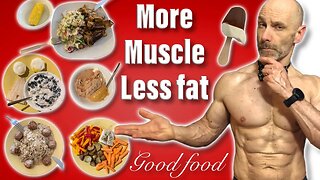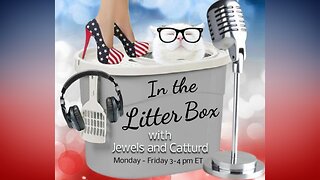Testosterone Myths, Hair, Libido, and Performance
Testosterone Myths, Hair, Libido, and Performance
Testosterone is lauded as the ultimate man hormone and as a result, it gets credited and blamed for a lot of things. Some are real and true, others are total myths and misconceptions. From thinking high testosterone causes male pattern baldness to believing by just taking testosterone we will improve our physical performance.
If you are interested in losing body fat and adding muscle, please email me at 1shark1bite@gmail.com for information on my personal training services.
Check your testosterone levels from home. Just click this link http://trylgc.com/laurence and receive 20% off with code: LAURENCE20 I receive commissions on referrals to LetsGetChecked. I only recommend services I know and trust.
My Affiliate link to Lebert for their Equalizer bars and more; https://lebertfitness.com/?ref=hmkesu... and use the discount code FITAND50 you will receive 20% off your purchase
Click this link for an additional 5% off one of the best priced Massage guns on the marketThe DEO-M8 and use the discount code FITAND50 https://deocore.com/?ref=hmkesuqvjzx
Facebook; https://www.facebook.com/Fit-and-50-5...
My Amazon page link; https://www.amazon.com/shop/fitand50
And let’s start right here at the top. Does high testosterone cause male pattern baldness? The reason it is though high testosterone does this and I used to think this myself is because of dihydrotestosterone more commonly known as DHT. It’s made from testosterone by an enzyme called 5-alpha reductase. And when DHT binds to receptors on our hair follicles, that are DHT sensitive then those follicles start to shrink and their life cycle is shortened. This does make it sound like testosterone is the cause, but in reality, it is the sensitivity of these receptors on our hair follicles that is to blame. Normal receptors are not overly sensitive to DHT and do not cause hair loss.
What determines the sensitivity of these follicles? Something that blesses us and curses us right from the day we are born and that is genetics.
The next myth we need to explore is that suffering from low testosterone is inevitable as we age. One of the things we really need to separate is ageing, from failing health and illness due to inactivity and poor dietary choices. The two biggest ways we can improve our testosterone is to lose excess body fat and become more active. Now I’ve talked about this in a lot of other videos so I’m not going to go into it in detail here. But there are plenty of studies that have shown that no matter what our age if we become more active and reduce our body fat levels we will increase our testosterone.
Because of the perceived connection between testosterone and age, it is often thought that we can bring back our youthful vitality, libido and erectile function by supplementing with testosterone. This is partially true. Higher testosterone tends to improve libido, which is the desire in our minds for sex and it stimulates receptors in our brain that release nitric oxide which is part of the process that is necessary for us to get an erection. Increasing testosterone alone though isn’t the solution. I’ll leave a link to a meta-analysis at the bottom of the description where they found that testosterone replacement therapy failed to improve erectile function in almost half of the cases studied. This was due to other health issues like diabetes, high blood pressure and cholesterol, as well as a couple of bad habits including smoking and alcohol abuse.
The majority of the reasons testosterone didn’t improve erectile function are preventable and a matter of improving our diet and exercise regiment. The same things that will improve our own natural testosterone levels.
One of the things that testosterone does whether it is our own natural testosterone or we supplement with TRT. Is it helps us maintain our lean muscle mass and reduce body fat. As a matter of fact, TRT will increase lean muscle mass and strength without training.
Most of these studies were done on men 60 years of age or older and what they concluded after reviewing all these studies is that while muscle mass and strength it did improve, physical function did not.
What physical function is, is the ability to perform the basic tasks of daily living and was often tested by the 6-minute walk test, the get-up and go test which evaluates the subjects ability to get up out of a chair walk a short distance and return to sitting.
If these men exercised not only would their strength have improved, but the function of their muscles would have too. So to get the most out of having testosterone replacement they would have to train and eat right, just like the guys who have kept their testosterone levels high through diet and exercise all along.
-
 5:31
5:31
Fit and 50
11 months ago $0.07 earnedHow Much Food to Build Muscle and Lose Fat (Including What I Eat)
4602 -
 1:27:44
1:27:44
Redacted News
2 hours agoBREAKING! EMERGENCY WHITE HOUSE MEETING OVER BIDEN HEALTH, COUP UNFOLDS | Redacted w Clayton Morris
90.4K214 -
 LIVE
LIVE
Battleground with Sean Parnell
2 hours agoAn Earth Shattering Week in American Politics w/ Bryan Dean Wright
1,889 watching -
 LIVE
LIVE
Revenge of the Cis
2 hours agoEpisode 1352: Blow Away
3,881 watching -
 19:42
19:42
TENET Media
1 hour agoEyewitness To Trump's Assassination UNIMPRESSED With Security | Matt Christiansen
4.81K5 -
 1:04:40
1:04:40
In The Litter Box w/ Jewels & Catturd
19 hours agoDems Torch Democracy | In the Litter Box w/ Jewels & Catturd – Ep. 609 – 7/22/2024
57.9K27 -
 1:07:03
1:07:03
vivafrei
2 hours agoABJECT CRIMINAL NEGLIGENCE! Summary of Kim Cheatle Congressional Hearing! Viva Frei Vlawg
55.2K143 -
 3:05:53
3:05:53
The Quartering
6 hours agoJoe Biden Incapacitated? Won't Even Finish His Term? Secret Service Testifies & It's Bad!
86.1K67 -
 DVR
DVR
Film Threat
8 hours agoVERSUS: STAR WARS IS DONE & WILL MARVEL MAKE A COMEBACK AT SAN DIEGO COMIC-CON? | Film Threat Versus
17K -
 33:31
33:31
Stephen Gardner
2 hours ago🔴Kamala Has PANIC ATTACK after Trump Surges ahead!
38.7K56